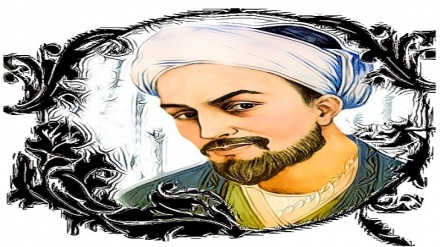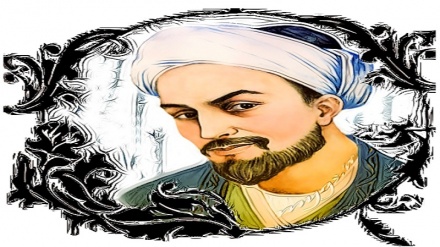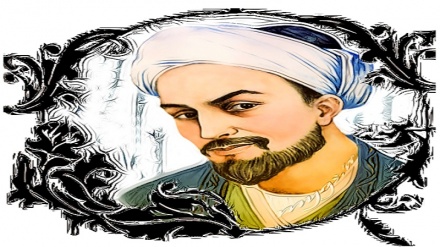Iranian notables, sources of global honor (199)
If you remember, it was said that Fakhruddin Eraqi was a prominent Muslim mystic and poet of Farsi language in the 7th century AH (13th century AD) who was born in Komjan village of Hamedan Province. It was also said that he learnt the Qur’an by heart in 9 months at the age of 5.
At the age of 17, Eraqi was a master of all sciences of the day and started teaching in the city of Hamedan. Very soon he left Hamedan for Multan in the Subcontinent to join the pupils of the renowned mystic of the time, Sheikh Baha’uddin Zakaria. Then, he reached a degree in mysticism that Sheikh Zakaria gave his own cloak to Eraqi and he became one of the prominent students of the Sheikh. Later on, he traveled to Mecca, and left there for Konia in today’s Turkey to attend the class of Sheikh Sadruddin Qunavi. Thus, he stayed in Konia till 675 AH when he went to Egypt and then Syria to stay in Damascus till the end of his life. It is said that Eraqi succumbed to a painful and fatal disease when he was 78 or 82 years old. He was buried at Jabal al-Salihiya behind the tomb of Muhyiddin ibn Arabi. Fakhruddin Eraqi has authored several books. This time we are going to dwell upon the features of Fakhruddin Eraqi’s poetry.
Fakhruddin Eraqi’s poetry is what has helped him to catapult to fame. He owes this fame to his inclination to the school of Muhyeddin ibn Arabi and also his special attention to the thoughts of Ahmad Ghazali. Mystic concepts shape the core of his words. Issues like unity of existence, love mixed with pain and escape from sanctimony are the main axes of his poetic school. He is among the last poets who were masters of Farsi Ghazal (lyric). The era of Eraqi, due to different reasons including the impact of the Mongol onslaught, lack of great circles to support men of letters, Qasideh (ode) declined and was replaced by lyric. For this reason, although there are all forms of poetry in Eraqi’s Diwan (collection of poems), most poems are in lyric. In that era, while romantic lyric continued its course, mystic lyric was also pursued by poets the climax of which can be seen in the works of Attar Neishabouri and Fakhruddin Eraqi. In the second half of the 7th century AH, there was no lyric poet who composed out of the domain of Sufism and mysticism. Eraqi is one of the great mystics who have founded their poetry on the salvaging ideals of mysticism. He has used love, chivalry, and escape from sanctimony to shape his poems. The core of his lyrics is mysticism and love, especially the real love. Eraqi founded a school that was based on love and beauty. He tended to the humane criteria of true mysticism to separate his path from the ostentatious mystics. Eraqi was one of the last poets enjoying high skill in lyrics. After Sanaei Ghaznavi, he played the key role in promotion of the quality and quantity of the school of escape from sanctimony.
Basically, lyric is the best means for mystics and poets to convey the concepts of mysticism and Sufism and also the intellectual and philosophical ideas. Eraqi has dealt with mystic concepts in his prose works, too. But in his lyrics, he has explicated these concepts more beautifully, fervently and eloquently. His poetic works are more voluminous than his prose. However, he has composed his poets in a simple language with short sentences. He says:
عشق شوری در نهاد ما نهاد جان ما در بوته سودا نهاد
Love made us zealous inwardly
And put our soul in melancholy
Many critics are of the opinion that Eraqi was much more successful in poetry rather than prose. Some maintain that the reason why he has not been so brilliant in prose is that concepts are more fluent and fascinating in the form of poetry. Naturally, poetry is more blended with emotion and imagination rather than thought and wisdom. Prose is written more consciously while poetry is often the outcome of the poet’s solitude. This is evident in the poetry of other languages, too. For instance, when we compare Ibn Farez Mesri with Ibn Arabi, we find that the former has mentioned mystic concepts and teachings in the form of poetry with less consciousness; but the latter has authored his works more consciously. Plainness and fluency of Eraqi’s poetry are such that there are few abstruse and obsolete words and terms in his works. Thus, lofty concepts are often mentioned in his poems in simple and short sentences. For instance, he says,
گرچه ز جهان جوی نداریم هم سر به جهان فرو نیاریم
Though we haven’t a barley seed in the world,
We’ll not bow to it to let our soul to be sold.
زآنجا که حساب همت ماست عالم همه حبهای شماریم
Where our effort is counted highly,
The world we deem as a seed of barley.
خود با دو جهان چه کار مارا ما شیفتة یکی نگاریم
We don’t heed the two worlds’ love,
As we have a Unique Beloved above.
RM/ME


